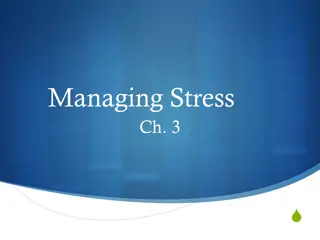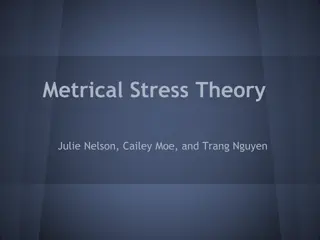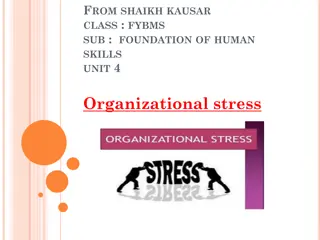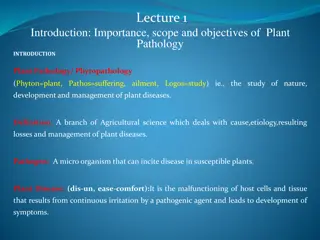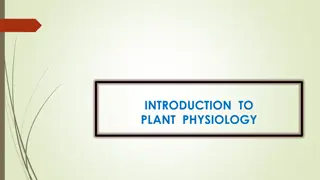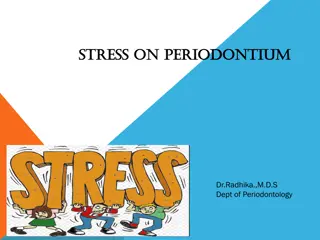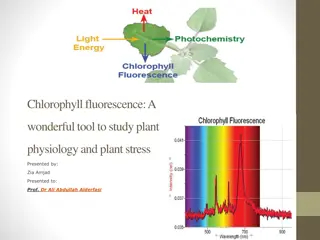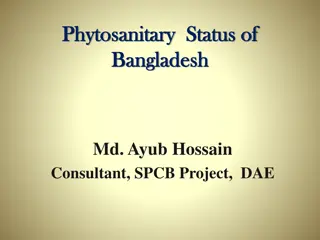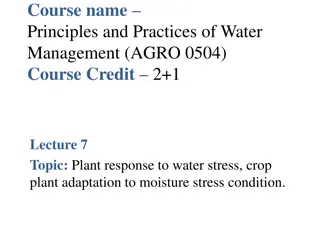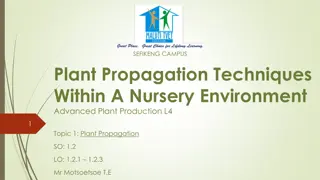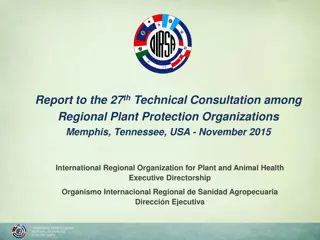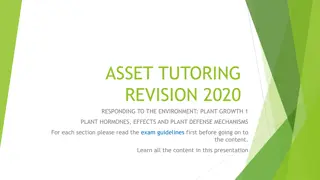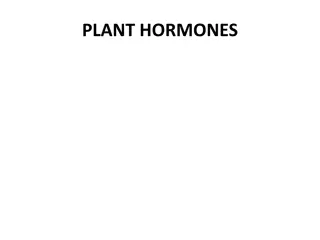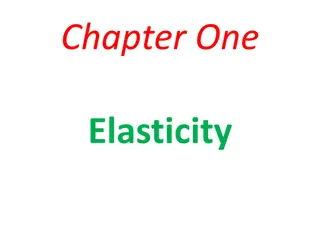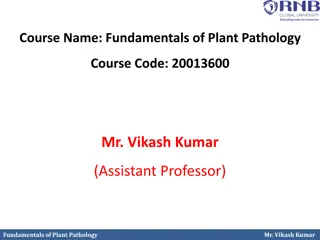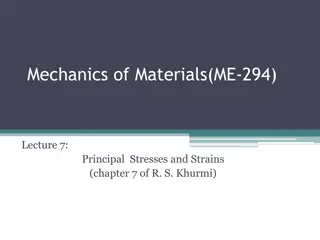Understanding Environmental Stress and Plant Management
Environmental stress, whether biotic or abiotic, can adversely affect plant growth and yield. Factors such as temperature extremes, waterlogging, radiation, chemicals, and pollution can lead to plant strains that may be reversible or permanent. Effective management of stress due to excessive moistur
9 views • 35 slides
Understanding Stress and Its Main Causes
Stress is a natural response to challenging events in life. Positive stress, known as eustress, promotes growth, while negative stress, distress, can be harmful. Major life changes, catastrophes, everyday problems, and environmental factors can all contribute to stress levels. Recognizing these caus
0 views • 20 slides
Exploring Metrical Phonology: A Brief Overview
Metrical phonology, a subtheory of generative phonology, focuses on categorizing stress and stress rules within rhythmic hierarchies. It differs from generative phonology by not treating stress as a segmental feature specific to vowels. Originating from Halle's linear analysis, metrical stress theor
0 views • 32 slides
Understanding Stress: Types, Management, and Sources
Stress is a complex phenomenon affecting individuals differently. It is crucial to comprehend stress, its sources, and how to manage it effectively. Claude Bernard's concept of the internal environment sheds light on the negative aspects of stress. Stress can be categorized into eustress (good stres
0 views • 24 slides
Understanding Organizational Stress: Impact on Performance and Coping Strategies
Stress in organizations is a state of imbalance between demands and capabilities, affecting individuals' emotional, cognitive, and physiological responses. Stress can be constructive or destructive, impacting job performance. Stress vulnerability is influenced by perceived control and autonomy level
0 views • 24 slides
Understanding Plant Tissue Culture Media and Their Importance in In Vitro Growth
Plant tissue culture media play a crucial role in the in vitro growth and morphogenesis of plant tissues. The composition of culture media depends on the specific plant species and the type of material used for culture. Various types of media, such as White's medium, MS medium, B5 medium, N6 medium,
0 views • 6 slides
Understanding Voice Stress Analysis for Deception Detection
Voice Stress Analysis (VSA) employs technology to detect micro-tremors in the vocal muscles that indicate stress, potentially linked to deception. Developed based on Dr. Lippold's work, VSA systems measure changes in speech characteristics caused by mental stress, aiming to assess the truthfulness o
0 views • 11 slides
Understanding Plant Pathology: Importance, Scope, and Objectives
Plant pathology, also known as phytopathology, is the study of plant diseases and their management. It covers the causes, symptoms, and impact of pathogenic organisms on plants. The field aims to understand the interactions between plants and pathogens, develop control methods, and reduce losses in
0 views • 6 slides
Understanding and Managing Stress for Optimal Health and Well-being
Stress is the body's response to various events and experiences, which can either help you rise to challenges or become overwhelming. It's vital to recognize and manage stress through establishing healthy lifestyle behaviors, recognizing symptoms of stress overload, and adopting stress management te
0 views • 9 slides
Understanding English Rhythm and Stress Patterns in Speech
Delve into the nuances of English rhythm and stress patterns in speech with a focus on word stress, phrase stress, and the principle of eurhythmy. Explore how stress is influenced by volume, pitch, and duration of syllables in monosyllabic, disyllabic, trisyllabic, and polysyllabic words, with empha
0 views • 25 slides
Introduction to Plant Physiology: Exploring the Functioning of Plants
Plant physiology is a crucial subdiscipline of botany that delves into the processes and functions operating within plants. This field closely examines areas like plant morphology, ecology, cell biology, and genetics, shedding light on vital processes such as photosynthesis, respiration, and more. T
1 views • 7 slides
Understanding Plant Stress and Management of Excessive Moisture
Environmental stress, both biotic and abiotic, can negatively impact plant growth. Factors like temperature, water, radiation, chemicals, pollution, and more can lead to strain in plants, affecting their development. Excessive moisture, particularly waterlogging, is a significant stressor that can r
0 views • 35 slides
European Standards for Plant Biostimulants Development
The European Committee for Standardization (CEN) plays a crucial role in developing European standards for plant biostimulants, focusing on improving plant nutrition processes independently of nutrient content. The CEN/TC.455 committee is responsible for creating standards supporting the EU Fertilis
2 views • 5 slides
Understanding Plant Tissue Culture: Techniques and Applications
Plant tissue culture involves maintaining and growing plant cells, tissues, or organs in artificial mediums under controlled conditions. It allows the regeneration of whole plants from small plant parts or cells. Hormones like auxins, cytokinins, and gibberellins are used in the process. Proper envi
3 views • 5 slides
Understanding the Impact of Stress on Periodontal Health
Periodontitis is a complex disease influenced by various factors, including stress. Chronic stress can negatively affect the immune response, leading to periodontal breakdown. This article explores the relationship between stress and periodontal health, discussing the mechanisms of action, effects o
2 views • 47 slides
Understanding Stress Corrosion Cracking and Corrosion Fatigue in Materials Engineering
Stress Corrosion Cracking (SCC) is a type of corrosion where the metal gets cracked due to the presence of a corrosion medium and tensile stress conditions. Factors influencing SCC include environmental composition, stress, metal composition, and temperature. Prevention methods involve selecting sui
0 views • 12 slides
Understanding Different Types of Stress and Coping Strategies
Stress can have different origins - anticipatory stress, situational stress, and residual stress. Learn to recognize each type and explore effective coping mechanisms to manage stress in various situations, from everyday challenges to traumatic events like the pandemic.
0 views • 6 slides
Understanding Stress: Impact on Mental and Physical Health
Stress is a state of strain due to internal or external factors. It can manifest as acute or chronic, impacting physical, mental, and emotional health. Acute stress is short-term and manageable, while chronic stress is dangerous and hard to cope with. Eustress, a positive form of stress, can enhance
0 views • 24 slides
Understanding Stress and Anxiety in Youth
Stress and anxiety are common challenges faced by youth today. This presentation by Dr. David Jacobi delves into the causes of stress, its effects on the body, mood, and behavior, and common signs to watch out for. It covers topics like stressors, stress responses, and the impact of stress on youth
0 views • 60 slides
Understanding Chlorophyll Fluorescence in Plant Physiology
Chlorophyll fluorescence is a powerful tool developed in the 1990s for studying plant physiology and stress. It provides insights into photosynthetic processes at different levels, from subcellular to canopy. By measuring chlorophyll fluorescence, researchers can assess the efficiency of photosynthe
0 views • 16 slides
Plant Tissue Culture Methods for Growth and Reproduction Study
Plant tissue culture methods such as root tip culture, shoot-tip culture, leaf culture, flower culture, and anther and pollen culture allow for the study of growth, reproduction, and genetic variations in plants. These techniques involve culturing various plant parts under sterile conditions to inve
1 views • 20 slides
Understanding Plant Quarantine and Phytosanitary Measures
Plant quarantine involves efforts to prevent the entry, establishment, or spread of foreign pests through legal restrictions on plant and plant product movement. It is crucial for safeguarding plant health, food production, and ecosystems. Phytosanitary measures aim to ensure the health of plants by
0 views • 33 slides
Understanding Mineral Nutrition in Plants
Mineral nutrition in plants involves the acquisition of essential elements in the form of inorganic ions from soil, followed by their absorption and utilization in various plant processes. Around 60 different elements have been reported in plants, with 30 being essential for plant growth. These esse
0 views • 39 slides
Plant Responses to Water Stress in Agricultural Management
Understanding how plants respond to water stress is crucial for effective agricultural management. Stress can affect plant growth and development, leading to various adaptations such as resistance, avoidance, and tolerance. This course explores the physiological mechanisms behind plant stress respon
0 views • 44 slides
Plant Propagation Techniques in Nursery Environment
Learn about plant propagation techniques within a nursery environment, including nursery operations, potting seedlings, plant protection, weed control, packing of nursery plants, and crafting tissues for plant growth. Explore the essential tasks involved in nurturing seedlings and trees before they
0 views • 17 slides
Summer School on Stress - Selye International Institute 2017
The Summer School on Stress organized by the Selye International Institute in 2017 in Komarno, Slovakia, offers a comprehensive program on biologic stress, its mechanisms, pharmacologic implications, and stress management strategies. Hosted by renowned experts, the course delves into stress-related
0 views • 5 slides
Plant Health Initiatives at the 27th Technical Consultation Among Regional Plant Protection Organizations - Memphis, Tennessee
The 27th Technical Consultation in Memphis, Tennessee focused on plant health initiatives by the International Regional Organization for Plant and Animal Health. OIRSA emphasized four key technical areas: plant health, animal health, agricultural quarantine, and food safety. Projects included addres
0 views • 13 slides
Understanding Stress and Its Impact on Health
Stress is a common phenomenon in today's fast-paced world, affecting individuals both mentally and physically. Hans Selye's concept of stress as a nonspecific response to change laid the foundation for understanding its physiology. Recognizing the symptoms of stress, including cognitive and emotiona
0 views • 13 slides
Plant Growth Hormones and Defense Mechanisms: Understanding Plant Responses to the Environment
Plant growth hormones and defense mechanisms play crucial roles in how plants respond to environmental stimuli such as water, sunlight, gravity, and more. From auxins promoting cell growth to gibberellins stimulating flowering, this presentation educates on the intricacies of plant hormones and thei
1 views • 13 slides
Understanding Plant Hormones and Their Role in Growth and Development
Plant hormones are vital compounds that regulate various processes in plant growth and development. They are mostly organic and can be gases. These hormones are produced in one part of the plant and transported to other parts where they induce physiological effects. The main phytohormones include Au
0 views • 125 slides
Understanding Psychological First Aid and Stress Management for Teens
Learn the importance of Psychological First Aid (PFA) in managing stress, the effects of stress on the mind and body, and how stress triggers the brain's response mechanisms. Discover common physical reactions to stress and how to identify and cope with them effectively. Explore the psychological an
0 views • 30 slides
Understanding Stress: Causes, Effects, and Management
Stress is the body's response to demands, events, or stimuli that exceed individual adaptive resources. It can have negative effects on physical and emotional well-being, leading to symptoms like weight changes, heart palpitations, and mood swings. However, not all stress is harmful; positive stress
0 views • 30 slides
Understanding Elastic Properties of Materials
Stress and strain are key concepts in understanding the elasticity of materials. Stress is the force acting on an object per unit area, while strain measures the degree of deformation due to stress. Different types of stress include tension, compression, and shear stress. The relationship between st
0 views • 41 slides
Exploring the Fundamentals of Plant Pathology: Understanding Viruses in Plant Diseases
Delve into the world of plant pathology with Mr. Vikash Kumar, as you learn about the nature, structure, and transmission of viruses affecting plants. Explore the important characteristics of plant viruses, their unique properties, and how they interact within plant cells. Gain insights into viral d
0 views • 14 slides
Stress Management and Relaxation Techniques for a Calmer Mind and Body
Discover effective ways to manage stress and promote relaxation in your daily life. Learn about the definition of stress, practical tips for stress management, the benefits of yoga in stress relief, and try a calming workout routine to ease tension and promote well-being. Explore the role of relaxat
0 views • 6 slides
Understanding Principal Stresses and Strains in Mechanics of Materials
Introduction to principal stresses and strains in Mechanics of Materials, covering transformations of stress and strain, combined stress analysis, and methods to determine stress states on arbitrary planes in loaded bodies. Details stress elements, stress analysis on inclined sections, and stress di
0 views • 24 slides
Understanding Stress and Effective Stress Management
Stress is a common part of life but managing it is crucial for overall well-being. This content delves into the concept of stress, its impact on health, common symptoms, and practical ways to manage it effectively. It emphasizes the importance of identifying stressors, adopting healthy coping mechan
0 views • 22 slides
Finite Element Modeling for Stress-Strain Analysis in 2D Structures
Explore the implementation of 2D stress-strain Finite Element Modeling using MATLAB. Understand the concepts of stress, strain, plane stress conditions, stress-strain relation, Turner Triangle in FEM, linear interpolation, stress and strain vectors, static equilibrium, and stiffness matrix. Learn ho
0 views • 18 slides
Understanding Stress and Depression - Symptoms, Causes, and Coping Mechanisms
Stress and depression are complex issues affecting many individuals. Stress can be both positive (eustress) and negative (distress), impacting various aspects of life. General adaptation syndrome explains the body's response to stress over time. External and internal sources of stress can influence
0 views • 13 slides
Comprehensive Stress Management Course by Department of Psychology
Explore the in-depth study of stress management in this course offered by the Department of Psychology. Covering stressors, symptoms, sources of stress, stress models, and practical stress management techniques, this course equips you with the knowledge and skills to effectively manage stress in var
0 views • 12 slides

